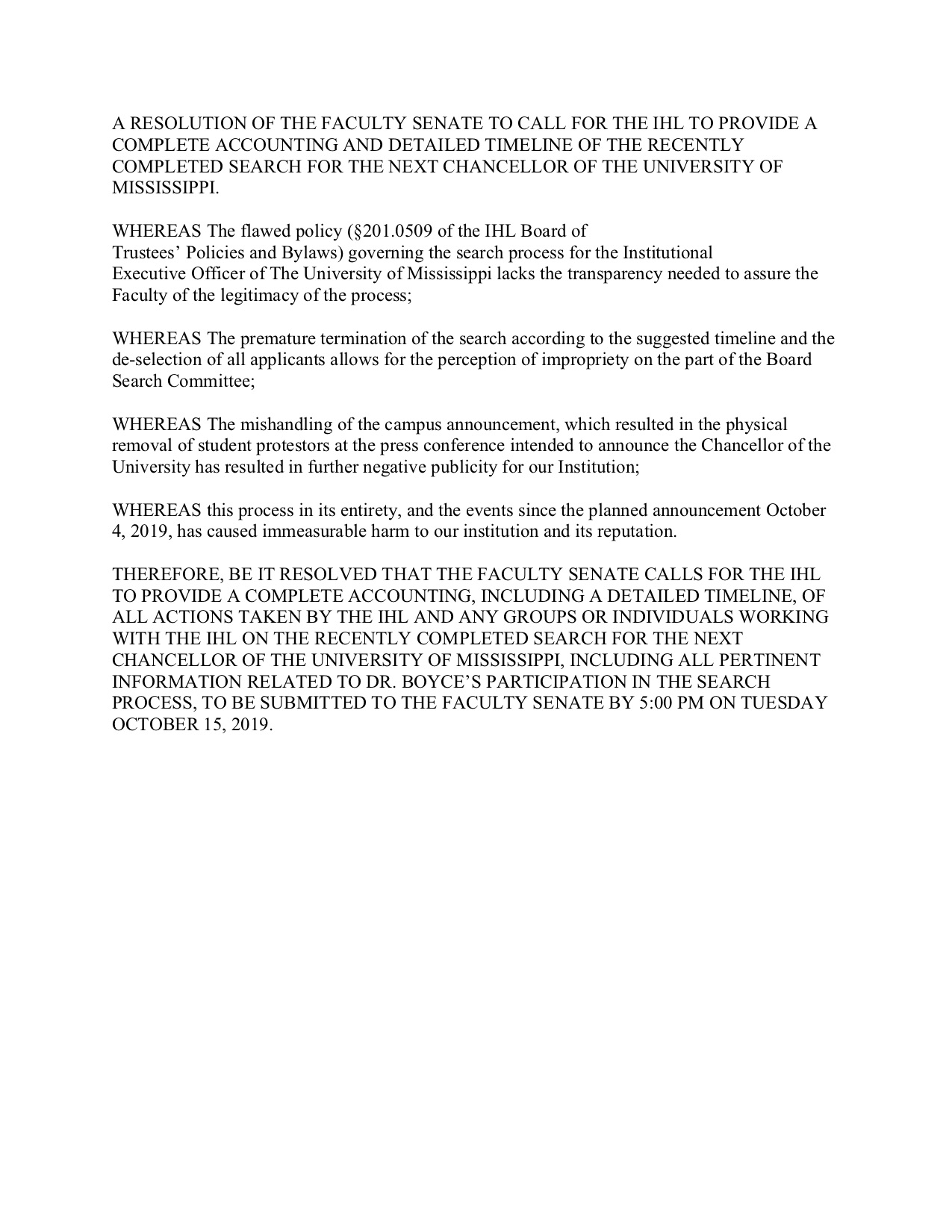By Talbert Toole
Lifestyles Editor
talbert.toole@hottytoddy.com

As protestors sat quietly in the back of the auditorium of the Thad Cochran Research Center Tuesday night, the majority of the Faculty Senate passed a resolution demanding clarity from the Institution of Higher Learning regarding the processes of selecting the University of Mississippi’s newest chancellor—Dr. Glenn Boyce.
Although two senators voted against the resolution, 44 voted in favor of passing the resolution which states that the senate demands a detailed and specific timeline leading up to Boyce’s hiring.
“Therefore, be it resolved that the faculty senate calls for the IHL to provide a complete and detailed accounting, including a detailed timeline of all actions taken by the IHL and any groups or individuals working with the IHL on the recently completed search for the next chancellor of the University of Mississippi, including all pertinent information related to Dr. Boyce’s participation in the search process, to be submitted to the faculty senate by 5 p.m. on Tuesday, October 15, 2019.”
On Friday, Oct. 4, the senate’s executive committee released a statement condemning the IHL of its actions prior to their vote on the resolution.
“We, the Executive Committee of the Senate of the Faculty of the University of Mississippi, find egregious the recent actions taken by the Mississippi Board of Trustees of State Institutions of Higher Learning (IHL) in connection with the search for the Chancellor of The University of Mississippi,” the statement read.
According to its Constitution, the Faculty Senate works as a governing body of the university representing actively employed faculty members. It is made up of representatives from each of the university’s departments.
Article II of its Constitution states, “The Senate shall be empowered to make recommendations to the Chancellor, Provost and Council of Academic Administrators on policies affecting the University and to advise on such matters as the Chancellor or Provost shall lay before it. It shall also keep the Faculty fully informed of its recommendations and report these recommendations at each meeting of the Faculty.”
Prior to the final vote, Zachary Guthrie, assistant professor of history, introduced an amendment to add additional verbiage to the proposed resolution.
Guthrie proposed language that would add a “No Confidence” clause against the IHL and Boyce; however, the amendment was voted down 42 to 1. A majority vote of no confidence by the board would mean, collectively, they do not support and/or disagree with the IHL and Boyce’s authoritative power.
Although the amendment did not pass, the senate floor did discuss that another resolution for “No Confidence” could happen in the next regular meeting or early as next week in a special meeting.
Currently the University of South Carolina is in under a formal review by The Southern Association of Colleges and Schools (SACS) for its process of hiring its new president.
The review comes because of SACS’ requirement of “undue influence,” which Guthrie expressed Tuesday night. His reasoning for the “No Confidence” clause was due to the fact the University of Mississippi could face the same consequence due to the controversial hiring of Boyce.

The resolution comes in the midst of a firestorm of outrage and confusion by the public regarding the IHL’s chancellor selection process. Members of the Campus Search Advisory Committee (CSAC), which the IHL formed to play an integral role in the search process, say the IHL negated the “appropriate” interview process with Boyce.
According to Ford Dye, IHL vice president, there were multiple candidates who did not interview with CSAC. He said the rules and process clearly state the search committee is and was allowed to skip certain steps if they deemed those steps unnecessary.
Boyce was involved in the initial search process serving as a hired consultant. In the position, Boyce collected and analyzed community opinions regarding who the board should select as the University’s 18th chancellor.
He said he was paid $87,000 by the University of Mississippi Foundation—which exists as a private institution—as a consultant. However, neither the IHL nor Boyce have confirmed the amount of time that transpired between the end of the consultation and his appointment as chancellor.
“I didn’t hire myself. The Board of Trustees hired me,” Boyce said to the media last Friday. “Once I completed my work—which was completed before the search ever started—I was finished.”
According to Dye, the IHL deemed that none of the candidates for chancellor fit the profile they created and offered Boyce the position. Boyce said he accepted the position after careful consideration of his love for the university.
Noel Wilkin, provost and executive vice chancellor for academic affairs, spoke to the senate prior to the vote on the resolution.
He said he will not comment on the particular process of hiring the newest chancellor but that he believes in Boyce.
“I believe he has the ability to successfully lead our university and I look forward to working with him,” Wilkin said.
Wilkin also said that Boyce is not interested in re-fighting certain battles at the university, such as the motion to relocate the Confederate monument. He said Boyce knows the monument is in the process of being relocated and plans to “let the process play out.”
During Friday’s media conference call, Boyce said he is not interested in the past but more focused on now and the future.
The Faculty Senate could hold a special meeting next Thursday to consider a “No Confidence” resolution. This is a developing story.
